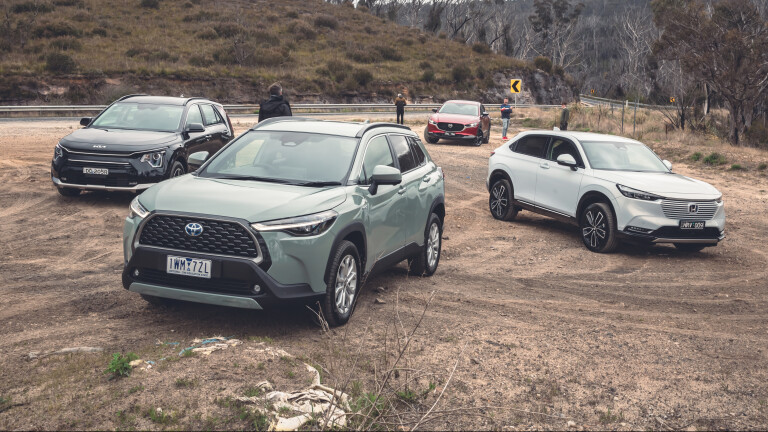
Things we like
- Corolla Cross: Class-leading dynamics, strong performance, big screen, spacious
- HR-V: Sophisticated packaging, excellent rear (for two), smooth handling, cheap servicing
- Niro: Efficiency, huge rear room, front seat comfort, leading warranty
- CX-30 petrol: Premium interior, excellent front seats, sporty drive, good value
Not so much
- Corolla Cross: Bitsy interior, touchy low-speed braking, patchy rear comfort
- HR-V: Modest performance, lumpy ride on scarred roads, front seats, room for four only
- Niro: Fidgety ride, artificial steering feel, plasticky cabin, equipment anomalies, pricier than rivals
- CX-30: Tight back seat, intimate cabin, thirsty
Hybrids on test: HR-V v Corolla Cross v Kia Niro ...and a CX-30 petrol? Read on.
Just moments ago, the bulk of Australia’s small SUV set seemed more like a reality-show cast than any kind of brains trust.
Larger and heavier than the hatchbacks that sired them, they offered neither the grunt, the space, or the value-for-money of lower-level medium SUVs costing only marginally more. For the most part, the small SUV allure wrested purely on visibility, manoeuvrability, and perceived modernity.
There were exceptions, such as Honda’s second-generation HR-V (2014-21) whose benchmark interior package somehow compensated for its patchy dashboard and detail design, and its dull drivetrain. Mazda’s likeable CX-3, on the other hand – now re-classified as a light SUV – included just enough extra interior room to make it appealing, though without the boost in boot space to sufficiently lift-and-separate it to true SUV status.
Clearly, the increasingly important small SUV category has been crying out for a fundamental shift in thinking – starting with under-bonnet tech and continuing with how much space and choice is offered for the price.
JUMP AHEAD
- The contenders: What do you get?
- Interior quality, comfort and space
- How do they drive?
- The quick word on cabins
- Scoring
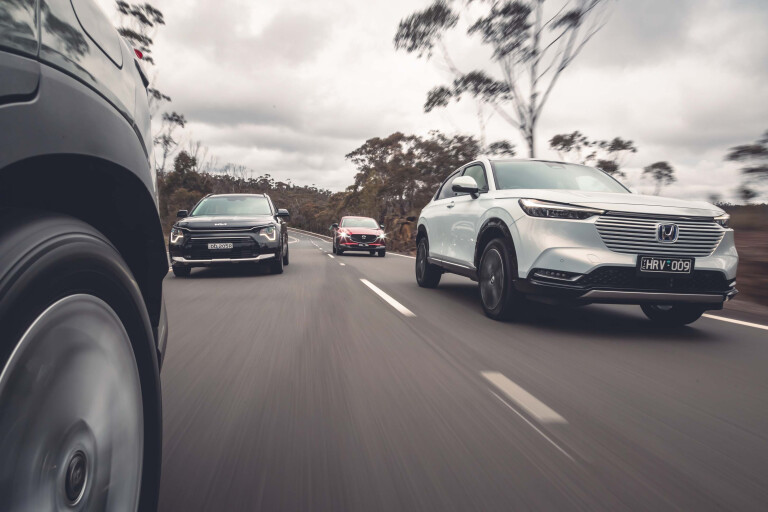
The contenders: What do they cost and what do you get?
| The basics | HR-V e:HEV L | NIRO S HYBRID | CX-30 G20 TOURING SP | COROLLA CROSS GXL HYBRID AWD |
|---|---|---|---|---|
| Price | $47,000 D/A (as tested) | $44,900 RRP (as tested) | $39,085 RRP (as tested) | $42,250 RRP (as tested) |
| Body | steel, 5 doors, 4 seats | steel, 5 doors, 5 seats | steel, 5 doors, 5 seats | steel, 5 doors, 5 seats |
| Length / width / height / wheelbase | 4335/1790/1590/2610mm | 4420/1825/1545/2720mm | 4395/1795/1540/2655mm | 4460/1825/1620/2640mm |
| Boot | 304 litres | 425 litres | 317 litres | 390 litres |
| Fuel/tank | 91 RON / 40 litres | 91 RON / 42 litres | 91 RON / 51 litres | 91 RON / 43 litres |
| Economy | 5.6L/100km (tested) | 4.8L/100km (tested) | 8.7L/100km (tested) | 5.9L/100km (tested) |
Toyota’s fresh-faced debutante is the Corolla Cross SUV – the first Australian model since the 1988-92 Corolla 4WD wagon to leverage the Corolla nameplate for a niche variant … though the Corolla Cross won’t be considered niche for long.
In its first month on sale, Toyota Australia shifted 1025 of them – instantly displacing the Corolla hatch and sedan (904 sales) in the popularity stakes, as well as Toyota’s sexier, more youth-oriented C-HR small SUV (585 sales).
What makes the Corolla Cross so appealing is its RAV4-in-a-concentrate vibe, the quality of its engineering DNA and the breadth of its range (eight variants, including five hybrids and two all-wheel-drive models), spanning $33-49K before on-road costs.
But two other new-generation small SUVs are attempting to lure Australian buyers with their cutting-edge chic – the third-generation Honda HR-V ($36-47K drive-away) and the Kia Niro ($44-72K before on-road costs) – plus the forthcoming all-new Nissan Qashqai ($34-47K plus on-road costs).
(You'll see our Qashqai reviews when the embargo drops in January – Stevo.)
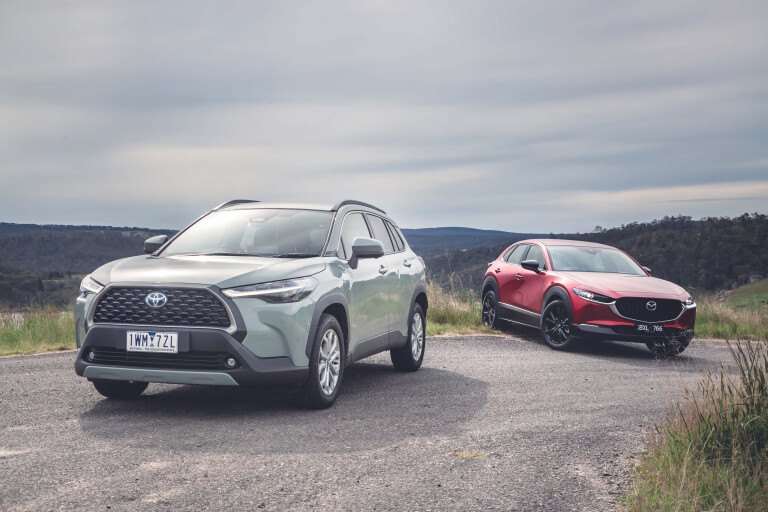
Honda offers a simple two-variant HR-V range – 1.5-litre petrol Vi-X and 1.5-litre petrol-hybrid e:HEV L – while Kia’s second-generation Niro arrives with either hybrid or full-electric power, each in S or GT-Line specification.
At $47,000 drive-away for an HR-V hybrid (in any colour) and $49,361 drive-away for our Niro S hybrid test car, the front-drive Corolla Cross GXL Hybrid’s $43,254 drive-away price starts to look pretty damn sharp … until you consider our wildcard for this test, the Mazda CX-30 G20 Touring SP, which at $43,369 drive-away is both competitive with the Toyota’s ask and $1545 cheaper than the larger-engined CX-30 G25 Touring SP.
Admittedly, the Corolla Cross GXL hybrid we have here is an AWD variant ($46,512 drive-away) – just over three grand more than the front-drive hybrid and garnished with multi-link rear suspension (instead of a torsion beam), a larger 43-litre fuel tank (versus 36 litres) and a tyre repair kit instead of a space-saver spare. But that’s still less than what the HR-V and Niro cost.
In a similar fashion, the obvious CX-30 for this comparison should be a G20e Evolve with its mild-hybrid 2.0-litre engine and an even sharper $41,362 drive-away price.
But with a combined fuel-consumption benefit of just 0.2L/100km over the G20 Touring SP’s non-hybrid engine, Mazda’s ‘M Hybrid’ hype appears to be mainly marketing driven. Indeed, the G20e’s negligible 0.3L/100km consumption benefit over the much more powerful 2.5-litre G25 engine proves that any CX-30 powered by a 2.0-litre is simply about price.
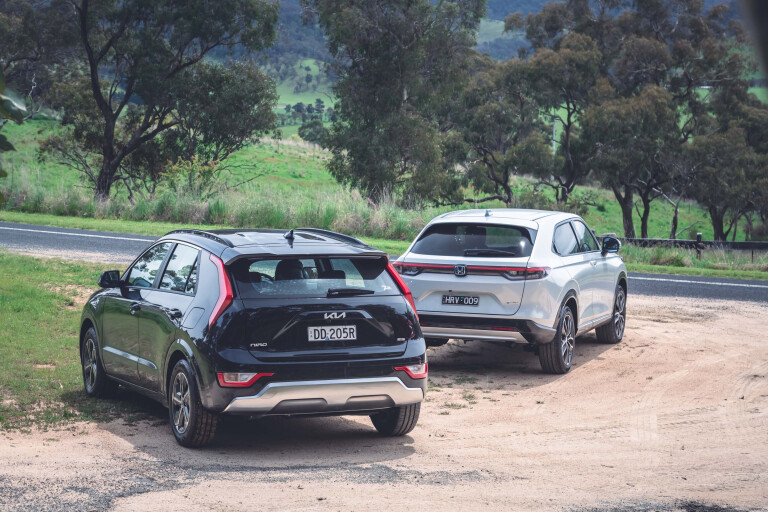
Getting inside
In concept, the Wheels COTY-winning CX-30 is a bit of a lone wolf here.
Intended to act as a more practical alternative to the coupe-like Mazda 3 hatch, the CX-30 maintains the hatch’s sporty, style-driven flavour, despite being classified as an ‘SUV’.
The Corolla Cross, on the other hand, is all about roomy conventionality, because Toyota already has the C-HR for buyers chasing edgy design.
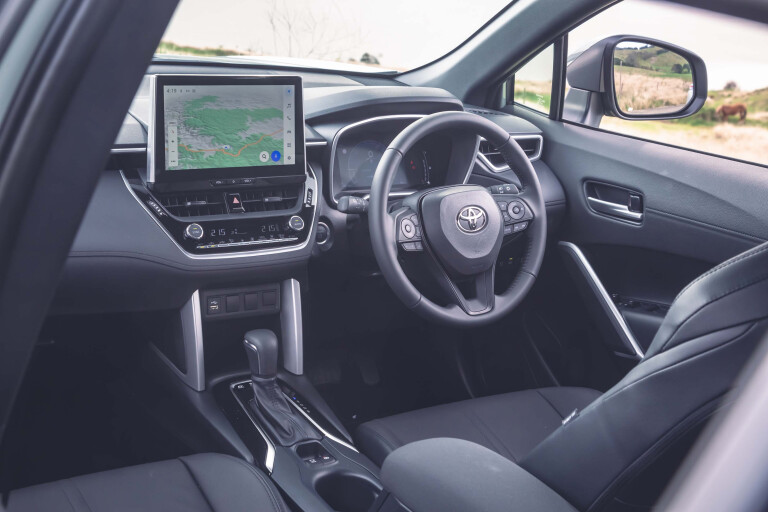
Once you’re inside the Corolla Cross, in fact, all memories of the C-HR’s rear-seat claustrophobia and helmet-like vision instantly vanish.
Not only is it quite big for a small SUV – the longest, tallest and equal-widest here, though sharing its 2640mm wheelbase length with the C-HR – there’s also a sense that the Corolla Cross’s overall design is about suiting as many lifestyles as possible while offending as few people as possible (with the possible exception of its ungainly US-market grille).
Compared to the relatively subtle front-end treatment of the Japanese-market version, the size, shape and positioning of our car’s grille looks jarringly out of place.
Front-seat comfort is generous (the GXL gets all-manual front buckets with electric lumbar for the driver) and there’s plenty of space, particularly headroom in the rear, though the Corolla Cross concedes a significant chunk of rear-seat legroom and cushion comfort to the HR-V.
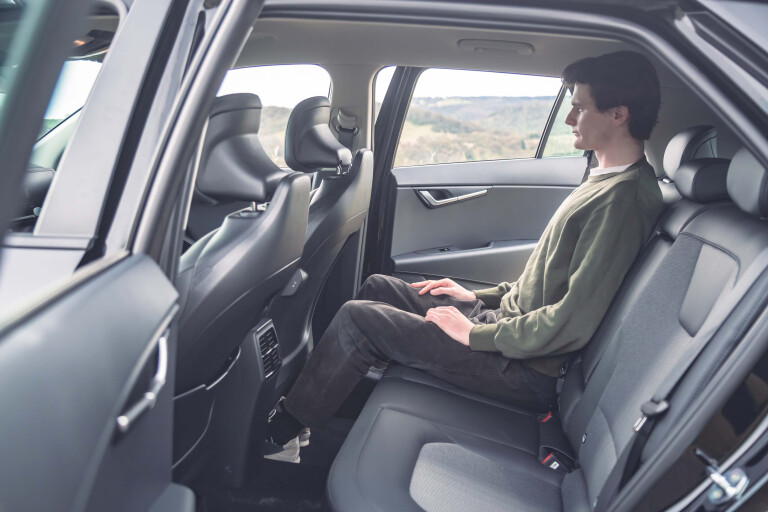
And typically for a manual-seat Toyota, only the driver gets height adjustment, leaving the back-left passenger staring into the broad front headrest of the too-high seat ahead of them.
The new HR-V mimics the Corolla Cross’s positioning in offering both petrol and hybrid powertrains while aiming to similarly maximise space. But it’s shaped more like a coupe than a wagon, which caps rear headroom for adults at no more than 188cm (6ft 2in), though the rear seat itself is excellent, with terrific support and clever footrests beneath the front seats – garnished with the flexibility of being able to lift both cushions vertically or flatten the whole lot in one balletic double movement.
However, the HR-V only gets two rear seatbelts in Australia – limiting it to four occupants – though, given the discomfort of the centre position, that’s less of a problem than it may appear. The all-manual front seats are set quite high, with no height adjustment for the passenger, restricting forward vision for rear-seat passengers.
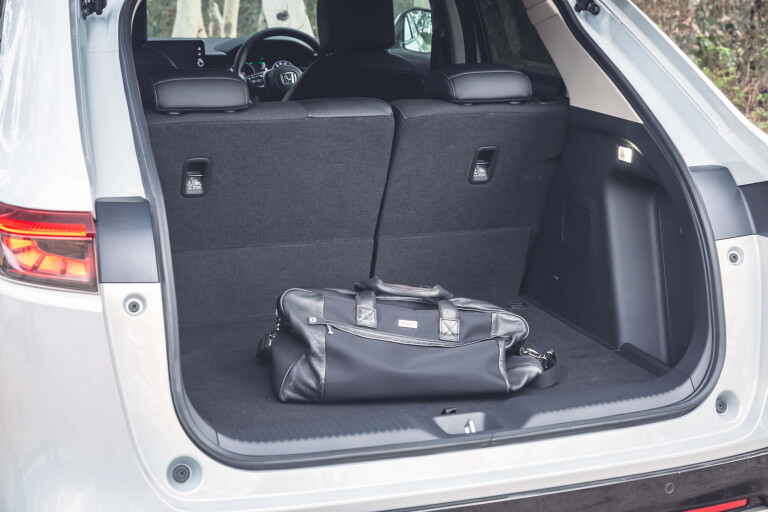
Then in a reversal of fortunes, the HR-V’s front seating lacks the plush comfort of the Corolla Cross’s buckets, though it counters with a lovely steering wheel, a sensible control layout, and an air of classy cohesion that shines in a sea of monotone black.
Aided by its class-leading 2720mm wheelbase, the Niro S is massive inside. The comfortable and supportive front seats feature plasticky-cool headrests that move forward in three positions, and the driver gets eight-way electric adjustment, joined by manual height adjustment for the passenger.
But there’s only one auto up/down window (driver) and the seriously huge rear-seat space is compromised by a seat cushion that’s too short, predominantly vinyl trim that feels clammy, and the ambience of a base model.
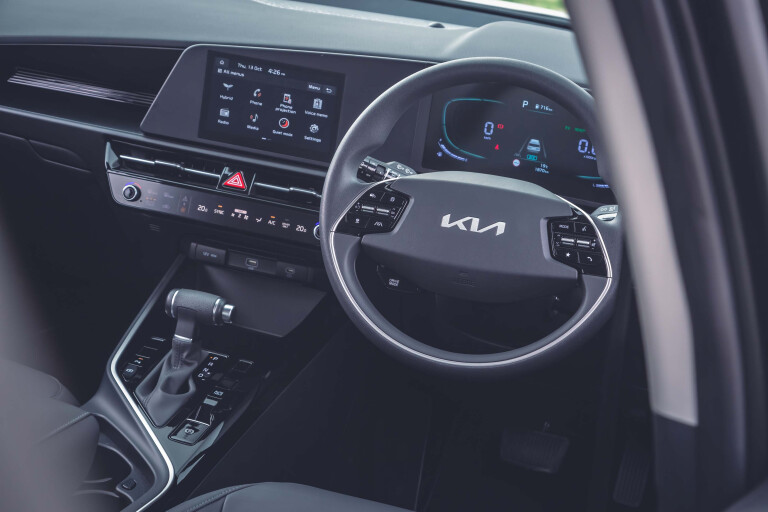
In terms of pure design, the Niro’s cabin is kooky enough to fascinate the inner child in all of us, but the entry-level S just doesn’t bring it together – particularly the low-grade infotainment screen that appears lost in a sea of mismatching plastic, and at odds with the old-school instrument graphics.
Obtaining the full tech effect in a new Niro requires you to stretch $6K further north to the GT-Line hybrid. Otherwise, you’re left wondering what’s missing from this nearly 50-grand car.
The opposite is true of the CX-30 Touring SP. In terms of overall interior quality, it feels special – even better than the Honda in its switchgear feel, plastics tactility, material quality and general feeling of expense, though with the occasional ergonomic hiccup (such as no digital speedo in the instrument pack – only the head-up display).
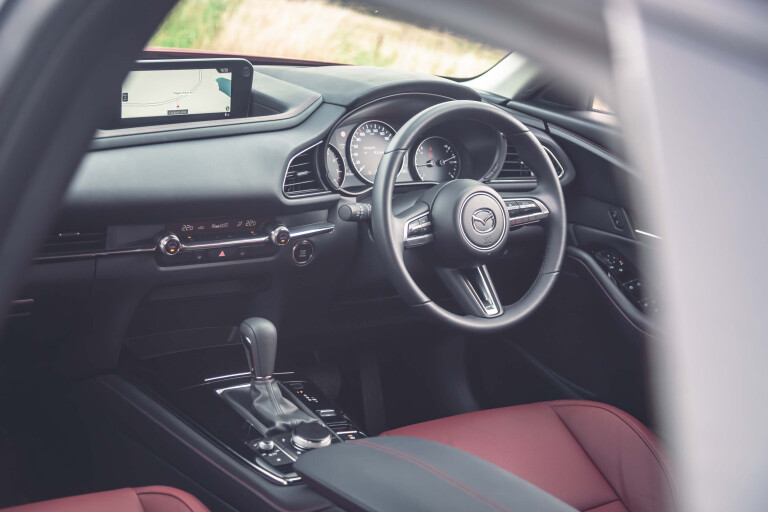
The steering wheel is great to hold, the front seats are excellent with loads of adjustment, and almost no Mazda interior is as colourful as this! The Touring SP mixes ivory-coloured headlining with burgundy leather trim to provide a level of designer chic that effortlessly transcends its low-40s price.
Yet the CX-30 is the opposite of the Niro for rear-seat room. It has a svelteness to its styling that few other small SUVs have, but the by-product of that is a compromised level of space, vision and luggage capacity – 317 litres in boot size compared to 425 litres for the Niro, 425 for the front-drive Corolla Cross (though 390 for the GXL AWD) and 304 litres for the HR-V (which it compensates for via its brilliant seat-folding theatrics).
In isolation, the CX-30 is entirely workable for carrying four adults, but compared to the voluminous Toyota, Honda and Kia, the racy-looking Mazda’s practicality is more of the ‘hatch on stilts’ type than an elevated small wagon.
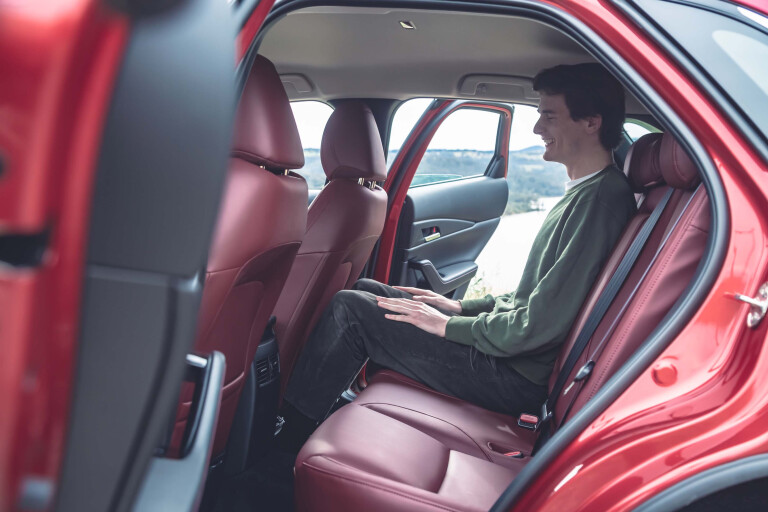
On the road
As SUVs, ride comfort should always be the priority – so how do these four fare?
| The basics | HR-V e:HEV L | NIRO S HYBRID | CX-30 G20 TOURING SP | COROLLA CROSS GXL HYBRID AWD |
|---|---|---|---|---|
| Power | 96kW @ 4000rpm | 104kW @ 5700rpm | 114kW @ 6000rpm | 146kW |
| Torque | 253Nm @ 0-3500rpm | 265Nm @ 4000rpm | 200Nm @ 4000rpm | not supplied |
| Suspension | Front: struts, A-arms, anti-roll bar. Rear: torsion beam, coil springs, anti-roll bar | Front: struts, A-arms, anti-roll bar. Rear: multi links, coil springs, anti-roll bar | Front: struts, A-arms, anti-roll bar. Rear: torsion beam, coil springs, anti-roll bar | Front: struts, A-arms, anti-roll bar. Rear: multi-links, coil springs, anti-roll bar |
| Steering | electric rack-and-pinion | electric rack-and-pinion | electric rack-and-pinion | electric rack-and-pinion |
| Front brakes | ventilated discs (293mm) | ventilated discs (282mm) | ventilated discs (295mm) | ventilated discs (305mm) |
| Rear brakes | solid discs (282mm) | solid discs (262mm) | solid discs (265mm) | solid discs (281mm) |
| Tyres | Michelin Primacy 4 | Nexen N-blue S | Toyo Proxes R56 | Bridgestone Alenza |
| Tyre size | 225/50R18 95V | 205/60R16 92H | 215/55R18 95H | 215/60R17 96H |
Where the above starts to pay dividends for the CX-30 is on the road. In blending its ‘Japanese BMW’ interior flavour and driving position with a reasonably focused level of dynamic appeal, the CX-30’s reason for being starts to become clearer.
It’s not as fun to drive as the Mazda 3 it’s derived from, yet there’s still much to enjoy about the way it performs on challenging roads – even this 114kW 2.0-litre variant – and the subtlety of its active safety systems if you minimise (or disable) their intrusion.
With four people on board, the CX-30 Touring SP does wash off some speed up hills unless you’re in Sport mode and giving it some throttle – however, when you’re driving one-up, it proves very effective at using the available torque (200Nm at 4000rpm) to comfortably maintain pace.
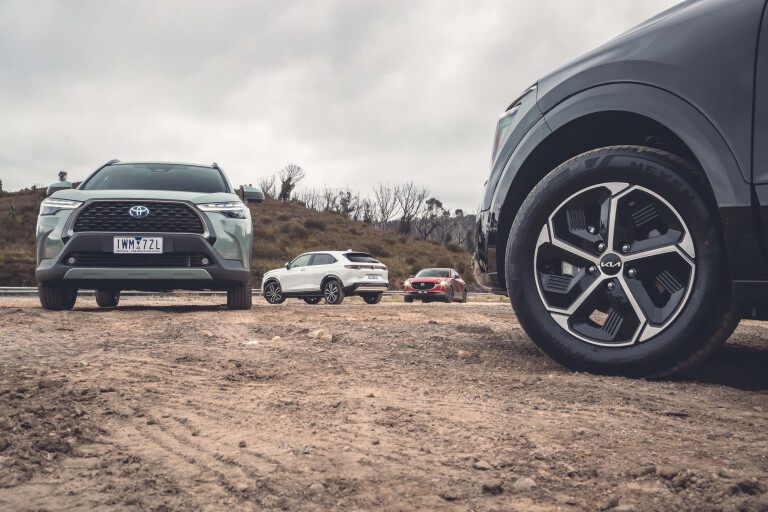
It also sounds quite pleasant when being extended to 6600rpm, which you need to do to really make it move quickly. And while we were unable to performance-test these four small SUVs at the dragstrip, a four-up, standing-start, foot-flat attack up a winding hill saw the 2.0-litre CX-30 crest the top doing a solid 100km/h.
For those who value polished dynamics over all else, then the best CX-30 variant is the base G20 Pure riding on chubby 215/65R16 tyres, not the 215/55R18s of our Touring SP – especially now that the Pure finally gets leather steering wheel trim. With taller sidewalls, the CX-30 becomes a sweeter-riding, more fluid-handling machine, with less irritation to steering and body movement through bumpy corners.
The most dynamic car of this group, however, is the Corolla Cross hybrid.
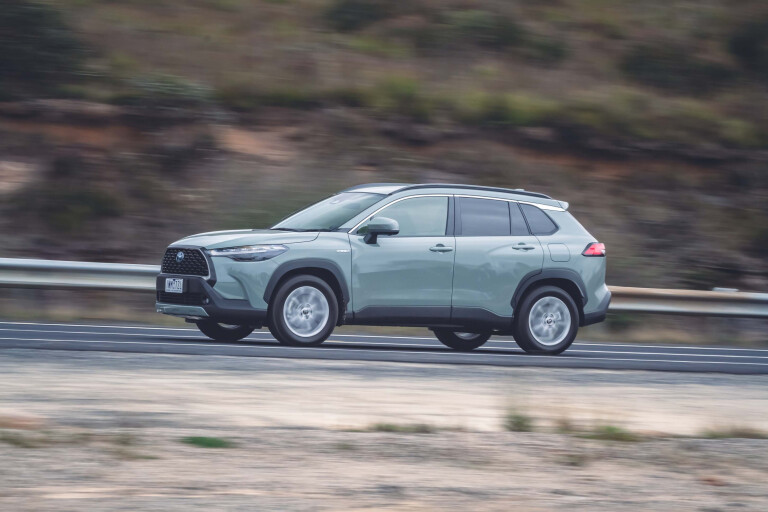
It doesn’t initially impress to any great extent – feeling rather bland, with annoyingly touchy low-speed braking response and a ride that isn’t as supple as its 215/60R17 tyres might suggest.
On first acquaintance, it seems to lack the silken dynamic polish of an equivalent-spec Corolla or C-HR, but the more you ask of it, the greater the sparkle of its mechanical DNA.
Admittedly, our test AWD’s multi-link independent rear suspension gives it a distinct advantage over the torsion-beam front-drive model, though given this variant still costs less than a front-drive HR-V or Niro (and about $400 less than a CX-30 Touring SP AWD), it seems like a fair deal.
Indeed, beneath the Corolla Cross’s unexciting wrapping hides a small SUV that’s entertaining to hustle, and keen to go there, with crisp, direct steering and a confident sense of balance that makes for delightfully fluid progress on mountain roads.
Combine its supple high-speed ride and poised handling with easily the strongest performance here – Toyota claims 0-100km/h in 7.6sec for the GXL AWD, which is Corolla SX/GTi hot-hatch territory from 30 years ago! – and it turns out the rather homely Corolla Cross hybrid is packing proper guns and buns.
On our hill test, the Corolla Cross crested at 117km/h – a decisive 20km/h faster than the keen-sounding but not-so-brisk HR-V. The extra torque of Toyota’s 2.0-litre Atkinson-cycle petrol engine with lithium-ion battery (for a combined 146kW) means it offers relaxed acceleration compared to the Honda’s revvy freneticism, with a surging strength to its power delivery.
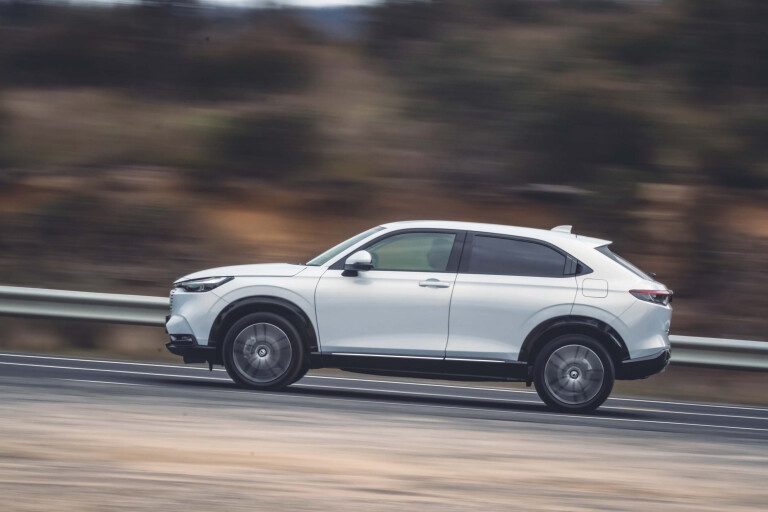
Thanks to its battery torque, the HR-V really kicks from a standing start
While the HR-V channels more than a hint of new-gen Civic in its design and flavour, it rides on a new-generation Jazz platform, hence its torsion-beam rear suspension. Unlike in Japan, our HR-V isn’t available with AWD, and unlike the Corolla Cross, our 96kW/253Nm HR-V hybrid isn’t blessed with grunt … but it’s not so bad.
Thanks to its battery torque, the HR-V really kicks from a standing start and the e-CVT does an excellent job of inserting ratio steps that feel completely natural – much better than any of this would appear on paper.
Honda’s small-capacity petrol engine doesn’t have the constant-rpm refinement that perhaps it could, though it sounds keen when winding itself out … which it needs to do frequently when carrying four people (its maximum, remember!) in hilly conditions. And it will hold a set cruise control speed perfectly.
Steering wheel paddles adjust regenerative braking, though the HR-V defaults back to zero after about 30 seconds in Normal drive mode, whereas in Sport it retains whatever setting you select (while sharpening throttle response and increasing steering weight).
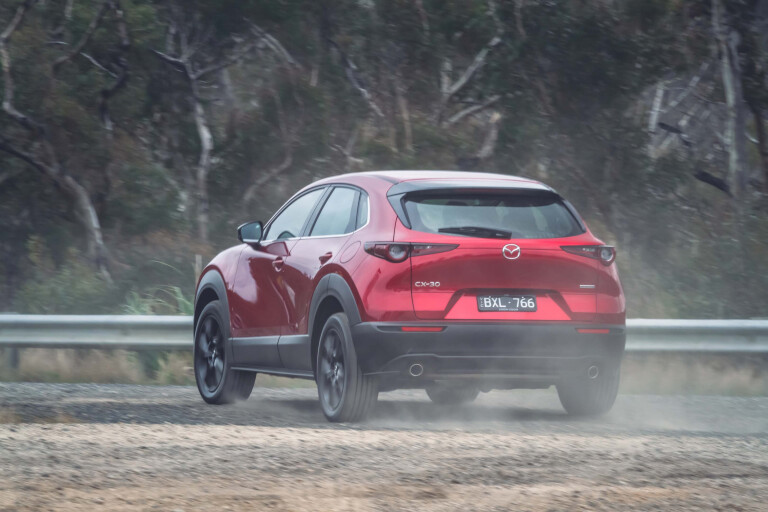
Speaking of which, the HR-V has a lovely steering wheel and an element of the new-gen Civic’s dynamic flavour, though it feels noticeably hiked to the heavens and doesn’t quite connect everything together.
Even though its steering only has 2.5 turns lock-to-lock, it lacks the superb turn-in of a Civic, yet when you’re deep into a corner and hooking it, the HR-V displays a decent wedge of the Civic’s handling balance.
There’s plenty of coarse-surface tyre noise from its 225/50R18 Michelins, though, and the HR-V’s ride quality – while displaying a suppleness under duress that eludes the new Civic – frequently feels lumpier than ideal, and pales in comparison to the polished comfort over rougher surfaces displayed by the Toyota.
Same goes for the Niro S hybrid, even though it’s wearing humble Nexen 205/60R16s. The Kia’s ride is surprisingly fidgety around town, though it does improve at higher speeds.
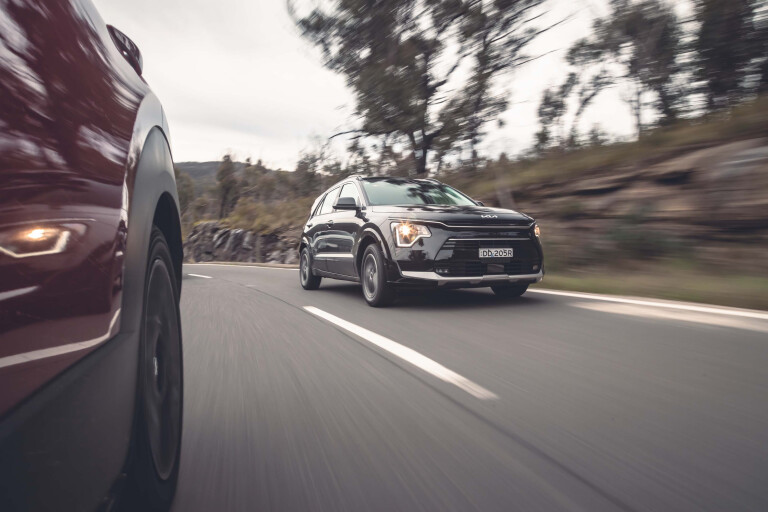
When hustled through corners, body control is good, turn-in is brisk, and handling feels balanced and confident, yet the Niro never feels encouraging or inspiring.
The Niro’s steering is its weakest link, with a heaviness when parking and vagueness at straight ahead, compounded by a cloudy and artificial feel at all speeds. At no point does the steering ever feel natural, regardless of the drive mode selected – choices are Normal and Sport. Or ‘doughy’ and ‘toey’ as we called them, neither of which is ideal in complementing the Niro hybrid’s character.
Normal delivers among the most dismal throttle response we’ve experienced in a modern car, as the driver almost fights with the accelerator travel to transfer right-foot inputs into meaningful movement. And then Sport goes completely the other direction – great if you’re trying to outrun the law but not so subtle at other times, and determined to knock out top gear, which isn’t ideal when you only have six of them.
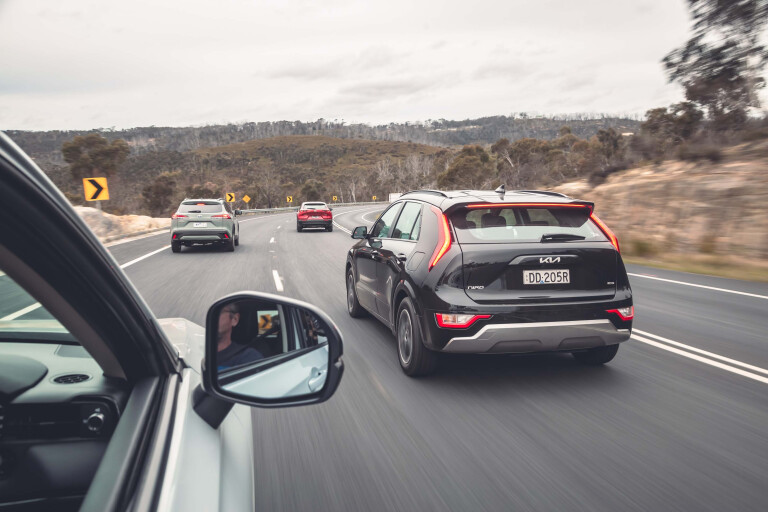
The Niro hybrid’s 104kW/265Nm 1.6-litre drivetrain with six-speed dual-clutch transmission is reasonably refined and acceptably powerful when asked for everything it has – Kia claims 0-100km/h in 10.4sec – to the point where it managed to outpace the HR-V and CX-30 in our hill test, clocking 105km/h.
More importantly, though, it proved convincingly the most economical on test – averaging an exceptional 4.8L/100km compared to 5.6L/100km for the hybrid HR-V, 5.9L/100km for the Corolla Cross hybrid and 8.7L/100km for the 2.0-litre CX-30.
In isolation, any of those fuel numbers would be respectable – all fed the minimum recommended octane – but then so too would the cars themselves. Size-wise, these four are bang on the zeitgeist for an effortless urban SUV – small enough to enhance their parkability but spacious enough to justify why you might choose one over an equivalent medium SUV. Yet there still isn’t a stand-out winner here.
The Niro hybrid’s 104kW/265Nm 1.6-litre drivetrain with six-speed dual-clutch transmission is reasonably refined and acceptably powerful when asked for everything it has
| The basics | HR-V e:HEV L | NIRO S HYBRID | CX-30 G20 TOURING SP | COROLLA CROSS GXL HYBRID AWD |
|---|---|---|---|---|
| Fuel/tank | 91 RON / 40 litres | 91 RON / 42 litres | 91 RON / 51 litres | 91 RON / 43 litres |
| Economy | 5.6L/100km (tested) | 4.8L/100km (tested) | 8.7L/100km (tested) | 5.9L/100km (tested) |
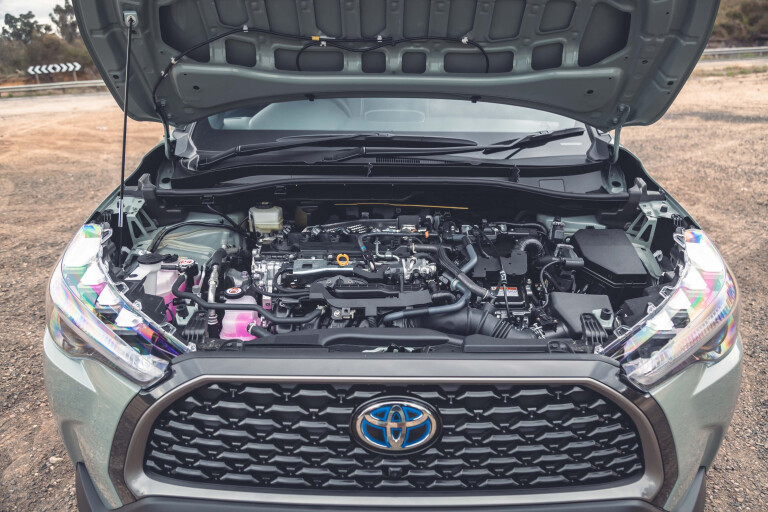
The car that spreads its talents widest is the Corolla Cross.
It looks awkward from certain angles, it feels cheap in certain areas inside, and it lacks visual flair – almost as if it’s an odd misstep for Toyota. Yet the Corolla Cross GXL hybrid is the only small SUV here that’s a true all-rounder.
When push comes to shove, it’s a clear dynamic leader and by far the strongest performer of the group – backed up by competitive levels of space and comfort, not to mention super-cheap servicing ($230 a pop). We just wish it displayed a bit more sophistication in its overall design.
In that department, the Honda HR-V pulls ahead. It blends a premium interior feel with premium exterior appearance, and beats the Toyota on the affordable servicing front ($199 a service for the first five years).
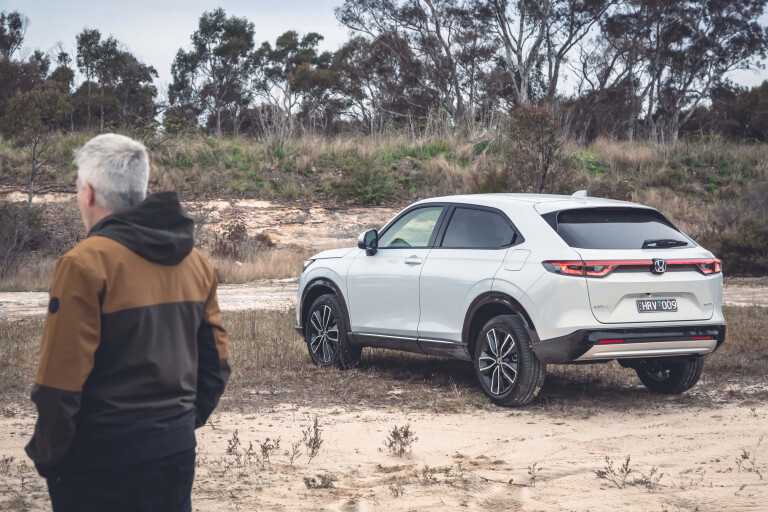
In its preferred environment (smooth, flat, twisty roads), it’s way beyond its predecessor, but we feel that Honda is missing an opportunity here – perhaps with a better-riding base model wearing the sexy 16-inch alloys of the Japanese-market Vezel G, complemented by a range-topper with the fancy interior, glassy roof and perhaps AWD.
The new HR-V hybrid is a handsome, likeable thing, but it’s not as consistent as the Corolla Cross in achieving its assigned tasks.
Kia’s Niro S hybrid treads a similar path, though is very much a car of contrasts. It’s the most expensive car here yet feels the cheapest inside; it’s not particularly quick but is incredibly frugal, even when driven hard; and its high-tech interior design isn’t matched by high-tech features.
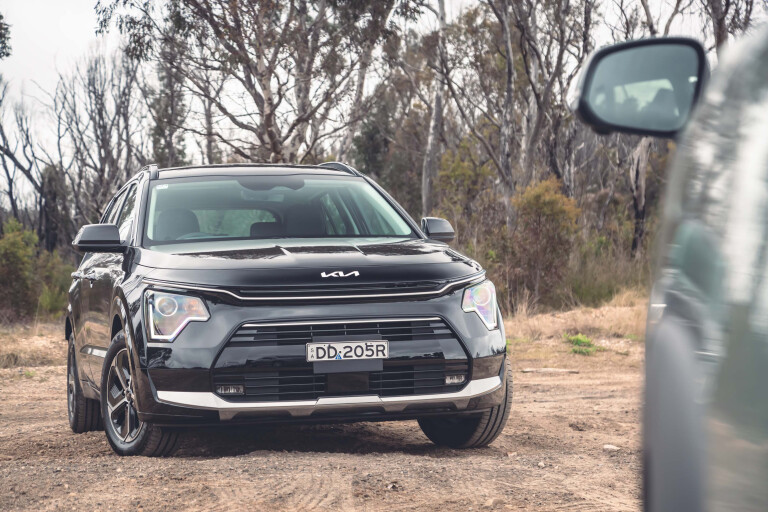
It’s also oddly detached to drive, with an underlying dynamic ability that it somehow doesn’t encourage you to discover. Yet even when you do, you just wish it had more feel.
That said, the Niro S hybrid would be a brilliant ride-share vehicle. Efficient, hugely practical and easy to wipe clean, with an appealingly long warranty, its characterful looks should be easy to spot as its rego plate approaches your front door.
Which leaves the Mazda CX-30 G20 Touring SP. It’s handsome, beautifully built, pleasant to drive briskly and encouragingly tractable, despite being the base-engined variant.
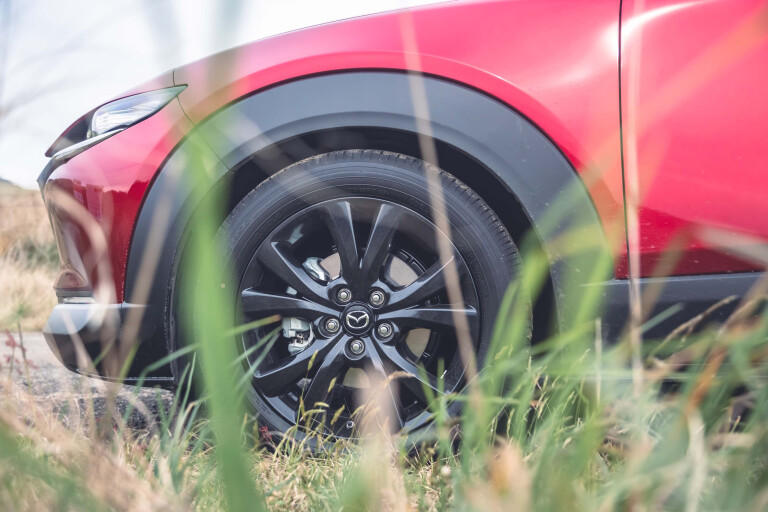
We referred to the CX-30 as a Japanese BMW several times, which provides insight as to how it looks and feels.
But it’s a much better car as a 2.5-litre – not only because it barely suffers in the fuel efficiency department (and let’s face it, the 2.0-litre is already miles behind the hybrids) but because it gives the relatively keen chassis more muscle to work with.
Had it the Toyota’s fast, frugal drivetrain and more packaging cleverness, the CX-30 would be excellent, though as a roomier, glassier, more liveable version of the Mazda 3 hatch, it’s a fine alternative. But as a small SUV intended to haul about families and their clobber, it’s very much an exercise in form over function. Ultimately, the CX-30 is more of a Toyota C-HR competitor than a Corolla Cross rival.
Seeing as Mazda is currently fleshing out its SUV range at Marvel-like speed, maybe a wagon-shaped CX-40 with a proper hybrid drivetrain could be exactly what the small SUV class has been begging for all along.
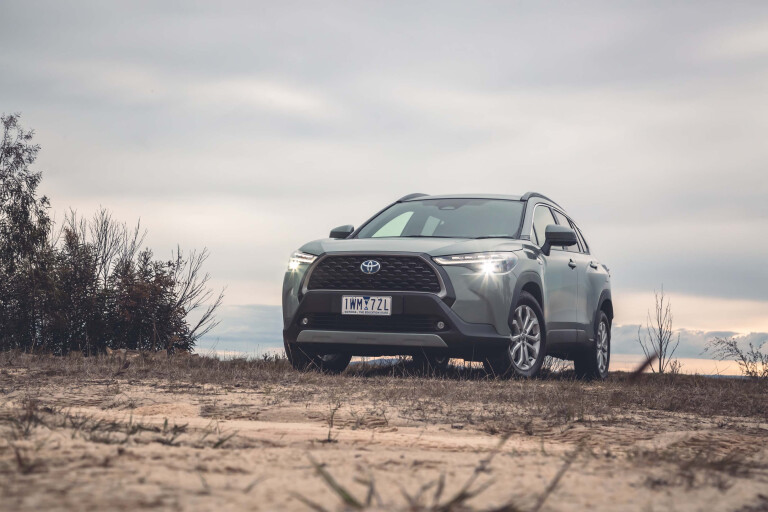
The quick take on interior appeal
Corolla Cross
The upper dash section is identical to a regular Corolla, and rock hard – just like the rear door trims – though overall treatment is bitsy. The GXL’s low-grade digital driver’s display looks amateur compared to HR-V’s crisp, cohesive set-up, and there’s only a single rear map pocket, no centre-rear armrest and oppressive dark roof lining.
But sub-1.25-litre bottles fit in all doors and there are two rear USB-C slots, as well as a huge 10.5-inch touchscreen with navigation and wireless Apple CarPlay plus robust sound quality from six speakers.
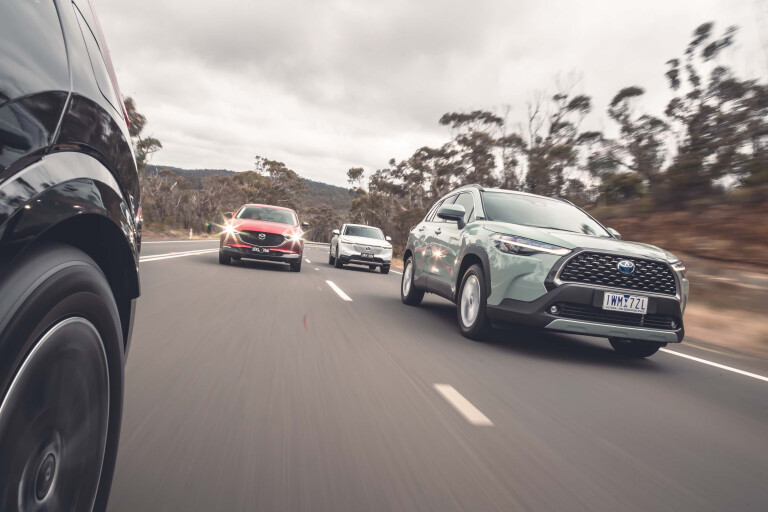
HR-V
The HR-V’s interior looks premium, like it’s worth the money – unlike the overly plasticky Niro – though it’s missing equipment from the top-spec Japanese model (there’s no dual-pane sunroof or two-tone interior treatment) and wireless charging is optional.
Limited drink storage in all doors compensated by a centre-rear armrest with cup holders, plus two rear USB-A slots and dedicated smartphone holders in the seat backs. A terrific new 9.0-inch touchscreen with decent sound from six speakers is a vast improvement over the outgoing HR-V’s appalling multimedia set-up.
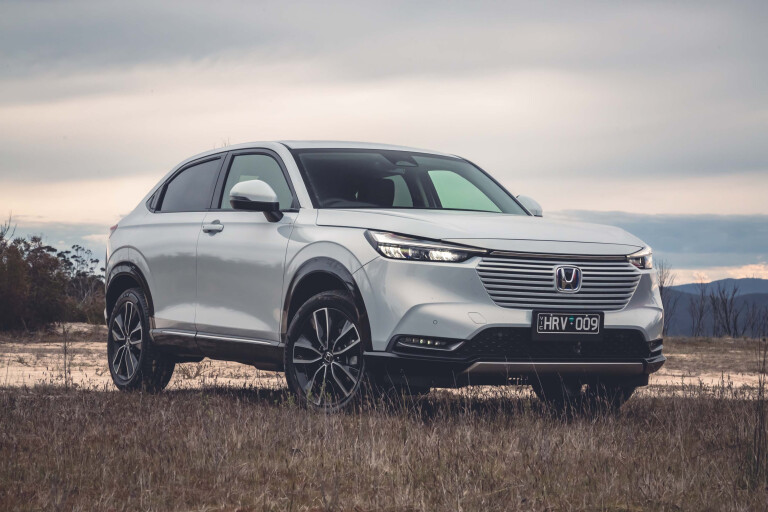
Kia Niro
With its T-bar shifter and single-bar steering wheel (with no leather rim), the Niro S conveys an intriguingly retro feel countered by space-age design flourishes. But closer inspection reveals the materials don’t live up to the hype.
The entire back door trim is just one cheap, hard plastic pressing, without any armrest padding. Poorly designed door pockets limit bottle storage, yet there’s tonnes of centre-console space. Rear passengers get USB-C slots and huge legroom, but only average seat comfort.
Kia’s base 8.0-inch infotainment screen (with wireless Apple CarPlay) lacks the processing speed of the larger 10.25-inch version.
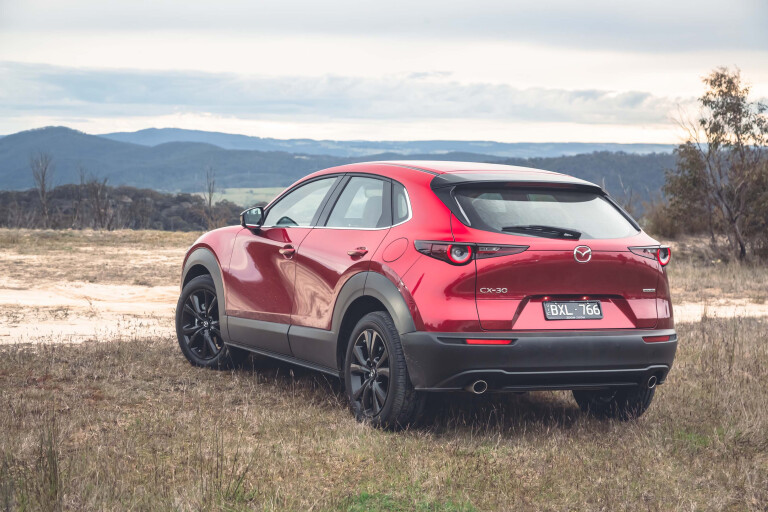
Mazda CX-30
Mazda’s racy-looking CX-30 is defiantly different to its rivals. It’s not trying to be a ‘space-as-the-only-frontier’ wagon, though that means a tight back seat with limited under-thigh support and tight headroom for those over 185cm.
Yet the front seats are excellent, all armrests are padded, as is the dash top, and it has proper door grabs and bottle storage. Premium levels of finish and quality extend to a classy 10.25-inch screen with robust Bose sound, though functionality is exclusively via the console rotary controller – tiresome when Apple CarPlay is being used.
SCORING
Toyota Corolla Cross hybrid: 8/10
What we liked
- Class-leading dynamics
- Strong performance
- Vast touchscreen
- Competitive space,
- Impressive front seats
Not so much
- Bitsy interior design
- Dorky exterior design
- Touchy low-speed braking response
- Patchy rear-seat comfort
Honda HR-V hybrid: 7.5/10
What we liked
- Sophisticated design and packaging flexibility
- Excellent rear seat (for two)
- Smooth-road handling
- Cheap servicing
Not so much
- Modest performance
- Lumpy ride on scarred surfaces
- Average front seats mounted too high
- Only has four seatbelts
Mazda CX-30 petrol: 7.5/10
What we liked
- Premium interior design and finish
- Excellent front seats
- Handsome styling
- Sporty flavour and driving feel
- Good value
Not so much
- Tight back seat
- Intimate cabin
- Thirsty compared to hybrid rivals
- Not as engaging to drive as a Mazda 3
Kia Niro hybrid: 7/10
What we liked
- Outstanding efficiency
- Huge rear-seat room
- Characterful design
- Front seat comfort
- Leading warranty coverage
Not so much
- Fidgety ride quality
- Artificial steering feel
- Plasticky cabin materials
- Equipment anomalies
- Pricier than rivals
| HONDA HR-V e:HEV L | KIA NIRO S HYBRID | MAZDA CX-30 G20 TOURING SP | TOYOTA COROLLA CROSS GXL HYBRID AWD | |
|---|---|---|---|---|
| Price | $47,000 driveaway (as tested) | $44,900 (as tested) | $39,085 (as tested) | $42,250 (as tested) |
| DRIVETRAIN | ||||
| Engine | 4cyl, dohc, 16v + lithium-ion battery | 4cyl, dohc, 16v + lithium-ion battery | 4cyl, dohc, 16v, direct injection | 4cyl, dohc, 16v + lithium-ion battery |
| Layout | front-engine (east-west), front-wheel drive | front-engine (east-west), front-wheel drive | front-engine (east-west), front-wheel drive | front-engine (east-west), all-wheel drive |
| Capacity | 1498cc | 1580cc | 1998cc | 1987cc |
| Power | 96kW @ 4000rpm | 104kW @ 5700rpm | 114kW @ 6000rpm | 146kW |
| Torque | 253Nm @ 0-3500rpm | 265Nm @ 4000rpm | 200Nm @ 4000rpm | not supplied |
| Transmission | CVT automatic | 6-speed dual-clutch | 6-speed automatic | CVT automatic |
| CHASSIS | ||||
| Body | steel, 5 doors, 4 seats | steel, 5 doors, 5 seats | steel, 5 doors, 5 seats | steel, 5 doors, 5 seats |
| L/W/H/W–B | 4335/1790/1590/2610mm | 4420/1825/1545/2720mm | 4395/1795/1540/2655mm | 4460/1825/1620/2640mm |
| Track (f/r) | 1535/1540mm | 1585/1596mm | 1565/1565mm | 1570/1570mm |
| Weight | 1382kg | 1454kg | 1438kg | 1545kg |
| Boot | 304 litres | 425 litres | 317 litres | 390 litres |
| Fuel/tank | 91 RON / 40 litres | 91 RON / 42 litres | 91 RON / 51 litres | 91 RON / 43 litres |
| Economy | 5.6L/100km (tested) | 4.8L/100km (tested) | 8.7L/100km (tested) | 5.9L/100km (tested) |
| Suspension | Front: struts, A-arms, anti-roll bar. Rear: torsion beam, coil springs, anti-roll bar | Front: struts, A-arms, anti-roll bar. Rear: multi links, coil springs, anti-roll bar | Front: struts, A-arms, anti-roll bar. Rear: torsion beam, coil springs, anti-roll bar | Front: struts, A-arms, anti-roll bar. Rear: multi-links, coil springs, anti-roll bar |
| Steering | electric rack-and-pinion | electric rack-and-pinion | electric rack-and-pinion | electric rack-and-pinion |
| Front brakes | ventilated discs (293mm) | ventilated discs (282mm) | ventilated discs (295mm) | ventilated discs (305mm) |
| Rear brakes | solid discs (282mm) | solid discs (262mm) | solid discs (265mm) | solid discs (281mm) |
| Tyres | Michelin Primacy 4 | Nexen N-blue S | Toyo Proxes R56 | Bridgestone Alenza |
| Tyre size | 225/50R18 95V | 205/60R16 92H | 215/55R18 95H | 215/60R17 96H |
| SAFETY | ||||
| ANCAP rating | 4 stars (Euro NCAP) | 5 stars | 5 stars | 5 stars |
| PERFORMANCE | ||||
| 0-100km/h | 10.6sec (claimed) | 10.4sec (claimed) | 10.0sec (claimed) | 7.6sec (claimed) |
Things we like
- Corolla Cross: Class-leading dynamics, strong performance, big screen, spacious
- HR-V: Sophisticated packaging, excellent rear (for two), smooth handling, cheap servicing
- Niro: Efficiency, huge rear room, front seat comfort, leading warranty
- CX-30 petrol: Premium interior, excellent front seats, sporty drive, good value
Not so much
- Corolla Cross: Bitsy interior, touchy low-speed braking, patchy rear comfort
- HR-V: Modest performance, lumpy ride on scarred roads, front seats, room for four only
- Niro: Fidgety ride, artificial steering feel, plasticky cabin, equipment anomalies, pricier than rivals
- CX-30: Tight back seat, intimate cabin, thirsty
COMMENTS